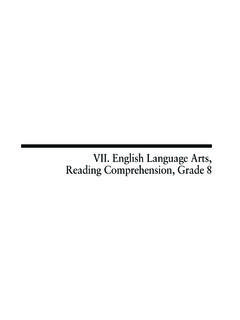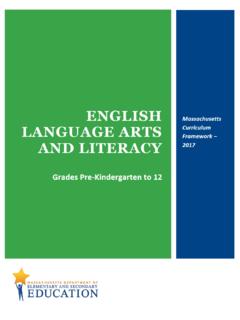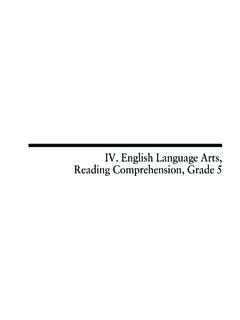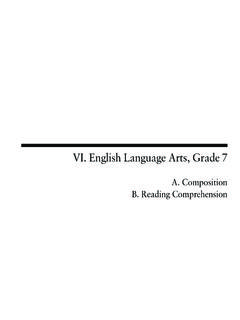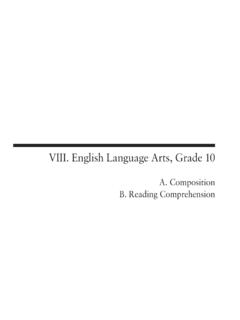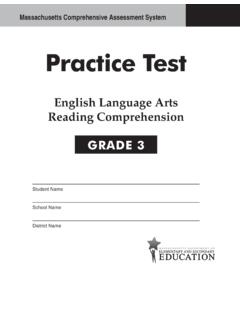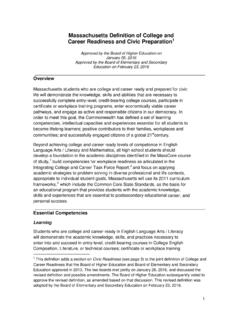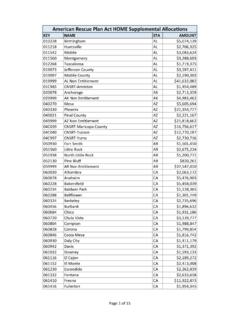Transcription of Massachusetts Dyslexia Guidelines
1 Massachusetts Dyslexia Guidelines Massachusetts Dyslexia Guidelines 2 AcknowledgementsJanuary 2020 StakeholdersPhoebe Adams, Adams Assessment and ConsultationDebra Ardon, Swampscott Public SchoolsEdith Bazile, educational consultant and DESE Special Education Advisory PanelKathleen Bernklow, Medway Public Schools Mary Calo, Millis Public SchoolsMaria Campanario, Boston Public SchoolsSuzannah Campbell, Medford Public SchoolsJulia Carlson, Wilson Language TrainingBarbara Cataldo, The Campus School at Boston CollegeEileen Catizone, Just Right Phonological AwarenessAbigail Cole, Martin Luther King Jr. Charter SchoolBrent Conway, Pentucket Regional School District Charlyn Cuffy, Davis Leadership Academy Charter SchoolRachel Currie-Rubin, Learning Solutions for Learning SuccessRuth Diaz, The Federation for Children with Special Needs and DESE Special Education Advisory PanelSandra Donah, Holyoke Public SchoolsNancy Duggan, Decoding Dyslexia MassachusettsNadine Ekstrom, EDCO CollaborativeFabienne Eliacin, Decoding Dyslexia MassachusettsLinda Ellis, Literacy Association Alison Elmer, Arlington Public SchoolsKrista Erikson, Gordon CollegeLinda Evans, Pittsfield Public SchoolsAmie Fernandes, Global Learning Charter Public SchoolMelissa Francis, Gloucester Public SchoolsNadine Gaab, Boston Children s Hospital/Harvard Medical School and Harvard Graduate School of Education Renee Greenfield, Amherst Public SchoolsMegan Gregory.
2 Scituate Public Schools Phyllis Hakeem, The Reading InstituteColleen Haughey Fraser, Dennis-Yarmouth Public SchoolsCharles Haynes, MGH Institute of Health ProfessionsCourtney Herzog, Lexington Public Schools student Adam Hickey, Landmark SchoolJulia Kimball, Milestones Day SchoolKatherine Kinsman, Landmark School Leslie Lockhart, Massachusetts Advocates for ChildrenMarisa MacDonald, Somerville Public SchoolsHope MacLeod, Martha s Vineyard Public SchoolsKathleen Malone, Winchester Public SchoolsLisa Martiesian, South Coast Educational Collaborative Patricia Mason, South Shore Educational CollaborativeAnne McKenzie, Hadley Public SchoolsLorette McWilliams, Assumption College and DESE Parent and Community Education and Involvement Advisory Council Laura Mello, Acton-Boxborough Regional School DistrictLaura Mendes, Springfield Public SchoolsMary Anne Morris, Springfield Public SchoolsLisa Nelson, Decoding Dyslexia MassachusettsCasey Ngo-Miller, Public Schools of BrooklineMargaret O Hearn-Curran, Leominster Public Schools and Fitchburg State UniversityCynthia Paris, Lawrence Public SchoolsKathleen Pastore, Dudley-Charlton Regional School DistrictKristy Peterson, Spencer-East Brookfield Regional School DistrictDanielle Pimenta, parent Carmen Pimentel, parent and DESE Special Education Advisory PanelNicole Piorkowski, parent Alison Quinn, Newton Public SchoolsDana Reder, Neighborhood House Charter SchoolRosemary Reidy, Auburn Public SchoolsJoan Sedita, Keys to LiteracyMichael Shaps, Waltham Public Schools Theran Singleton, Nantucket Public SchoolsSara Stetson, Andover Public SchoolsTom Stewart.
3 Parent and DESE Special Education Advisory PanelJanet Stratton, The Reading InstituteElizabeth Stringer Keefe, Stonehill CollegeClare Sullivan, parentMichelle Sylvaria, Boston Public SchoolsJanet Thibeau, International Dyslexia AssociationKevin Tobin, Learning SolutionsLeah Towler, Worcester Public Schools Jennifer Traverso, Westford Public Schools Kathy Trujillo, Springfield Public SchoolsMarcia Uretsky, Westwood Public SchoolsMarilyn Vrountas, Somerville Public SchoolsDandan Wei, Pioneer Valley Chinese Immersion Charter SchoolKara Ann Westerman, Spencer East Brookfield Regional School DistrictAlicja Wisnosky, Webster Public SchoolsJanuary February 2021 StakeholdersMassachusetts Administrators of Special Education (ASE)Decoding Dyslexia Massachusetts (DDM)Commonwealth Preschool Partnership Initiative (CPPI) grantees: Holyoke, New Bedford,and Springfield Public SchoolsElementary Principals Executive BoardDESE English Language Learners/Bilingual Education Advisory Council (ELBAC)Federation for Children with Special Needs (FCSN)SPAN Parent Advocacy NetworkDESE Special Education Advisory Panel (SEAP)Center for Instructional Support Literacy LeadersMassachusetts School Psychologists Association (MSPA) Massachusetts Council for Exceptional Children (MCEC)
4 Massachusetts Urban Project department of Early Education and CareChris Pond, Behavioral Health and Special Education SpecialistCrafting MindsMelissa OrkinLeandra ElionNovak Education ConsultingLindie JohnsonPivot LearningMonica Ng, Pivot LearningAmanda Marcotte, University of Massachusetts -AmherstMichelle Hosp, University of Massachusetts -AmherstDale Webster, Consortium on Reaching Excellence in Education (CORE) Massachusetts Dyslexia Guidelines 3 Table of ContentsAcknowledgements 2 Foreword 4 Chapter 1: Introduction 5 Chapter 2: Defining Dyslexia 10 Chapter 3: The Importance of Screening for Risk of Dyslexia 18 Chapter 4: Selecting and Implementing a Universal Tool for Screening Risk of Dyslexia 22 Chapter 5: The Role of a Multi-Tiered System of Supports (MTSS) in Screening for Risk of Dyslexia and Providing Appropriate Instruction 32 Chapter 6: Targeted Reading Intervention at Tiers 2 and 3 43 Chapter 7: The Role of Progress Monitoring in Measuring Students Response to MTSS Interventions 54 Chapter 8: Dyslexia and Special Education 59 Chapter 9: Considerations for English Learners at Risk for Dyslexia 69 Glossary 74 Appendix A: SLD Data Tables 76 Appendix B: Levels of Phonological Awareness 78 Appendix C.
5 Assistive Technology (AT) Considerations 80 Massachusetts Dyslexia Guidelines 4 ForewordI am excited to share the much anticipated Massachusetts Dyslexia Guidelines , co-developed by the Departments of Elementary and Secondary Education and Early Education and Care, to implement specific requirements of An Act Relative to Students with Dyslexia , Chapter 272 of the Acts of 2018. Chapter 272 was enacted in October 2018 and took effect on January 17, 2019, amending Chapter 71 of the Massachusetts General Laws to add the following provision:Section 57A. The department of elementary and secondary education, in consultation with the department of early education and care, shall, subject to appropriation, issue Guidelines to assist districts in developing screening procedures or protocols for students that demonstrate 1 or more potential indicators of a neurological learning disability including, but not limited to, Dyslexia .
6 Chapter 71, 57A, added by St. 2018, , 1, effective January 17, Guidelines will provide direction and support for district staff at all levels and parents to ensure that students with Dyslexia and other learning disabilities receive the education they are entitled to, starting with early identification and continued access to evidence-based practitioners will be doubly supported by our Guidelines and the Mass Literacy Guide, developed by our colleagues in the Center for Instructional Supports Literacy and Humanities unit. The Dyslexia Guidelines were developed to work in tandem with the Mass Literacy Guide, which provides comprehensive access to the evidence-based literacy practices critical for reading success for all students. These resources together form a wealth of information and did not do this work alone, as we have been so very fortunate to have sustained guidance and feedback from dedicated stakeholders who partnered with us throughout the development of the Guidelines .
7 Our first group of approximately 90 stakeholders included people with disabilities, parents of students with disabilities, district and school leaders, general and special education teachers, reading specialists, school psychologists, speech and language pathologists, special education directors, and Dyslexia researchers, including nationally known neuroscientists. These experts helped to steer the initial development of the Guidelines during two meetings in January 2020. Following the release of the Guideline s draft chapters, listening and feedback sessions with 12 different groups of stakeholders were held during January and February 2021. These sessions included participants from two DESE advisory councils, elementary principals, school psychologists, education advocates, special education directors, and literacy leaders, among others.
8 We received insightful feedback on the content of the Guidelines , as well as helpful guidance on how the subsequent roll-out and implementation might take shape. It is our hope that the Massachusetts Dyslexia Guidelines will create the critical bridge between research and practice and positively impact the education of children in Massachusetts for years to come. Russell D. Johnston, Director of Special Education and Senior Associate CommissionerCenter for District SupportMASSACHUSETTS Dyslexia Guidelines Chapter 15 Massachusetts General Law Chapter 71 Section 57A directs the department of Elementary and Secondary Education1 to issue Guidelines that support district development of screening procedures for students demonstrating one or more potential signs of a neurological learning disability including, but not limited to, Dyslexia .
9 These Guidelines have been developed as a clear and practical set of organized, relevant, and research-based best practices for the early screening, instruction, and accommodation of students with reading difficulties, learning disabilities, and Dyslexia . The Guidelines are intended to assist district administrators, all educators, regardless of their role, and families to make informed educational decisions that will result in supportive, effective practices and the best possible outcomes for Massachusetts Dyslexia Guidelines serve three purposes: To provide a set of screening Guidelines for all students, including students demonstrating one or more potential signs of a neurological learning disability including, but not limited to, Dyslexia ; To provide a framework of intervention for students at risk of Dyslexia and other learning difficulties that is timely and responsive.
10 And To provide a comprehensive resource of evidence-based practices aimed at all educators to support students at risk of Dyslexia and those identified as having Dyslexia , consistent with and linked to other guidance from , families, and other stakeholders have indicated that an external source of direction is urgently needed to make effective and sustainable changes in school practices. The Massachusetts Dyslexia Guidelines can be that catalyst for change. The most widely accepted definition of Dyslexia was adopted by the National Institute of Child Health and Human development (NICHD) in 20022 and remains the official definition for the International Dyslexia Association (IDA).31 Introduction Massachusetts must move from a reactive, deficit-oriented model to a proactive, preventive model. Classroom teachers need the knowledge of the science of reading and evidence-based practices.
